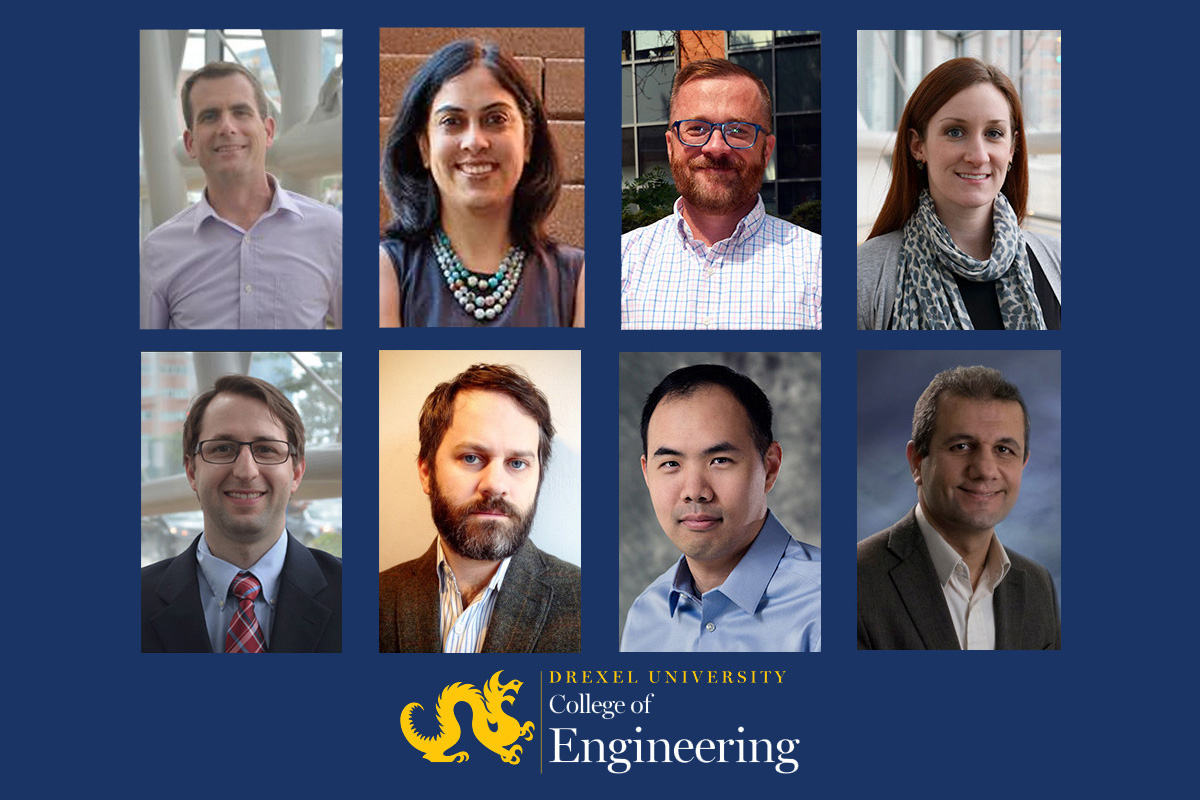 Left to right, top: Abrams. Kalra, Weyant, Sullivan. Bottom: Snyder, Waring, Lo, Najafi
Left to right, top: Abrams. Kalra, Weyant, Sullivan. Bottom: Snyder, Waring, Lo, Najafi
Eight members of the Drexel Engineering community have earned recognition
from the Office of the Provost for their contributions to teaching,
scholarship and advising.
Cameron Abrams, PhD, professor and department head in chemical and biological engineering,
received an award for Outstanding Career Scholarly Achievement. The award
recognizes a faculty member who has sustained an extraordinarily high-level
of scholarly activities which have had a major impact in the greater
community and/or on public perceptions of Drexel University.
The funding from Abrams’ award will support the refurbishment of his lab’s
Linux workstations, supporting computational work in molecular simulations
and computational drug design. This will help in the development of new
directions, including collaborative projects studying the molecular biology
of SARS-CoV-2, which recently yielded the
publication of a study
in the peer-reviewed journal Viruses.
Vibha Kalra, PhD, associate professor of chemical and biological engineering, received an
award for Outstanding Mid-Career Scholarly Achievement. The award recognizes a faculty member who has demonstrated unusual excellence and become a recognized leader in their scholarly field.
Kahlra’s research combines material assembly and characterization, study of
fundamental electrochemical behavior, in-situ spectroelectrochemistry, and
device assembly and testing to develop nanofiber-based energy storage
devices, including next-generation batteries and supercapacitors. She has
published more than 50 peer-reviewed journal articles and has five pending
patents in the field of nanofibers for energy storage.
Christopher Weyant, PhD, teaching professor in materials science and engineering, received the
Evidence-Based Teaching Award in Undergraduate STEM. The award is given
annually to a full-time faculty member in a STEM department who uses
pedagogical strategies that have been demonstrated in the literature to be
effective in teaching students, or who has developed an innovative approach
that they are evaluating in their own classrooms.
Weyant has employed several active learning approaches shown to improve
student outcomes in his classes, including flipped classroom, problem-based
learning, problem solving studio and student response systems.
Rosemary Sullivan, associate director of academic advising in the Undergraduate Advising
Center, was recognized with the Outstanding Professional Advisor Award. The
award recognizes the extraordinary contributions of advisors who guide
student progress through their academic paths across the University.
Sullivan currently advises mechanical engineering students in their first
three years. She also coordinates the Engineering Leadership Scholars
program, which is a peer mentorship and leadership development program for
College of Engineering students.
Joshua Snyder, PhD, associate professor in chemical and biological engineering, and Michael
Waring, PhD, professor in civil, architectural and environmental
engineering, received Faculty Scholarly Materials and Equipment Awards.
For Snyder, the award will fund the purchase of a gas chromatograph/mass
spectrometer that will be used to identify and quantify the products formed
leaving an electrochemical conversion reactor. The goal of his research is
to develop a technology to replace traditional thermochemical reactors. If
successful, the reactions used to create fuels from petroleum and biomass
derivatives could be completed with lower energy and reduced greenhouse gas
emission, making the production of fuels a cleaner and more renewable
activity.
Waring will use the award to improve his ability to conduct detailed
submicron particle measurement in his lab. Waring’s research explores how
various household and external particles affect indoor air quality, and how
airborne pollutants and toxins can be reduced from indoor environments.
James Lo, PhD, assistant professor in civil, architectural and environmental engineering
and
Ahmad Najafi, PhD, assistant professor in mechanical engineering and mechanics, received
Faculty Summer Research Awards.
Lo will use the award this fall to support a graduate student researching
how machine learning models can be used to approximate ventilation rate in
buildings, a topic which became even more relevant in the wake of the
COVID-19 pandemic. The goal of the research is to determine how much
ventilation a space will receive if certain doors or windows are open to
the outside in different weather conditions. Machine learning will help
speed the modeling process versus using fluid dynamics and physical models.
Najafi will further his research on bioinspired vascular networks used as
cooling applications in batteries, fuel cells, aircraft and other
electronics. Using a computer program, the project can model the ideal
layout of paths for cooling liquid to travel, with minimal interruption in
efficacy in the case of severe blockages.